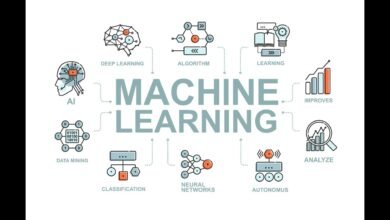AI in FinTech: Innovation, Challenges, Solutions

Introduction to AI in FinTech

Integrating AI into FinTech has sparked transformative adjustments, redefining how financial services operate. By leveraging AI in FinTech, corporations enhance efficiency, accuracy, and accessibility in handing over economic answers. This energy allows tailor-made offerings, streamlined approaches, and innovative merchandise, ultimately democratizing finance and expanding admission to previously underserved populations. AI-driven insights and automation drive FinTech’s evolution, empowering groups and purchasers to navigate the economic panorama more efficiently.
Applications of AI in FinTech
Fraud detection and prevention
AI algorithms are instrumental in combating monetary fraud by scrutinizing enormous datasets in actual time. Through pattern popularity, those algorithms flag anomalies and aberrant behaviors, substantially bolstering fraud detection talents compared to conventional methods. By unexpectedly pinpointing suspicious sports, AI-pushed systems enhance protection and limit monetary losses for organizations and individuals. This sophisticated technology represents a paradigm shift in fraud prevention, offering proactive measures to protect financial transactions and uphold compliance in the digital economy.
Customer service and chatbots
AI-driven chatbots revolutionize customer service by providing immediate assistance, managing inquiries, resolving troubles, and swiftly facilitating transactions. These virtual assistants leverage AI algorithms to offer tailor-made hints, improving the customer experience. Chatbots provide customized help by successfully studying user options and conduct, guiding users through complicated tactics. With their potential to operate 24/7 and adapt to numerous scenarios, AI-driven chatbots streamline interactions, reduce wait times, and foster client delight, creating loyalty and retention.
Per in the long personalized financial advice
AI algorithms examine non-public economic facts to provide customized advice, spanning budgeting, saving, and funding techniques. These AI-powered platforms deliver tailor-made suggestions, empowering clients to make knowledgeable financial choices aligned with their desires and preferences. By leveraging superior statistics analytics, AI complements monetary literacy and promotes responsible cash management, in the long run facilitating human beings to reap their financial objectives with self-assurance and performance.
Algorithmic trading

AI in FinTech algorithms autonomously executes trades using predefined parameters, reading full-size marketplace information to locate lucrative possibilities. With speedy and accurate decision-making competencies, computerized trading systems allow traders to leverage marketplace dynamics efficaciously. These algorithms optimize funding strategies by capitalizing on fluctuations and tendencies, enhancing capability returns, and minimizing dangers. This streamlined process empowers retailers to guide financial markets confidently, leveraging AI in FinTech to reach their asset objectives efficiently.
Benefits of AI in FinTech
Enhanced efficiency and accuracy
AI algorithms autonomously execute trades using predefined parameters, reading massive marketplace statistics to locate rewarding possibilities. With rapid and correct choice-making capabilities, automatic trading systems enable buyers to leverage marketplace dynamics successfully. These algorithms optimize funding techniques by capitalizing on fluctuations and trends, improving ability returns while minimizing dangers. This streamlined method empowers buyers to navigate monetary markets confidently, leveraging AI generation to achieve their investment objectives effectively.
Improved customer experience
AI-pushed solutions revolutionize consumer experiences via customized pointers, fast support, and frictionless transactions. FinTech companies optimize interactions by predicting consumer choices and fostering better pride and loyalty. This proactive approach streamlines methods and builds stronger client relationships, driving lengthy-term engagement and emblem advocacy. With AI’s potential to adapt and evolve, FinTech agencies can continuously refine their services, ensuring they stay aligned with purchaser expectations in an ever-changing landscape.
Risk management
AI-driven risk control gear utilizes superior algorithms to investigate challenging datasets, comparing and mitigating numerous dangers, including credit score, marketplace, and cybersecurity threats. AI augments risk assessment by furnishing actual-time insights and predictive analytics, permitting proactive chance mitigation techniques. This proactive approach empowers organizations to count on and cope with capability threats unexpectedly, fortifying their resilience in opposition to unexpected demanding situations and successfully safeguarding their assets and operations.
Challenges and limitations of AI in FinTech

Data privacy and security concerns
The integration of AI in FinTech prompts legitimate worries regarding the privacy and security of touchy economic facts. AI systems necessitate considerable datasets for education and choice-making, heightening the significance of robust facts safety measures. Safeguarding consumer data via stringent protection protocols and encryption strategies is paramount to mitigate the risk of facts breaches and unauthorized entry. Additionally, obvious privacy regulations and regulatory compliance frameworks are essential to instill acceptance as accurate and uphold the integrity of monetary establishments using AI technology.
Regulatory compliance
Navigating the regulatory landscape surrounding AI in finance offers a multifaceted assignment for AI in FinTech firms. The dynamic nature of rules necessitates continuous tracking and version to ensure compliance with evolving standards. Hitting a proportion between creation & adherence to ethical ideas is vital for accountable AI deployment in financial offerings. By enforcing sturdy governance frameworks and fostering collaboration with regulators, FinTech corporations can successfully navigate regulatory complexities while upholding the integrity and trustworthiness of their AI-driven solutions.
Bias and ethical considerations
Addressing algorithmic bias is essential for the FinTech industry as AI algorithms can inadvertently perpetuate discrimination significantly in credit score scoring and loan approval processes. Ensuring equity and transparency in AI-pushed choice-making requires proactive measures, including records diversification, bias detection tools, and algorithmic audits. FinTech companies can mitigate biases, uphold ethical requirements, and promote agreement amongst stakeholders and the broader network by prioritizing fairness and inclusivity in AI development and implementation.
Future Prospects of AI in FinTech

The integration of AI technology is poised to revolutionize the FinTech panorama similarly, propelling innovation and transformation at some stage in the arena. Breakthroughs in AI, including natural language processing, predictive analytics, and deep knowledge acquisition, will considerably augment the abilities and versatility of FinTech answers. These improvements will enable extra sophisticated threat assessment, customized monetary offerings, and more advantageous purchaser stories, ultimately reshaping how economic services are brought up in the digital age.
Conclusion
AI in FinTech is reshaping the FinTech enterprise by introducing groundbreaking solutions that bolster efficiency, raise purchaser reports, and mitigate dangers. While AI holds tremendous potential for AI in FinTech companies, navigating demanding situations surrounding statistics privateness, regulatory compliance, and moral considerations are paramount. FinTech groups can build, agree with, and ensure the sustainability of the AI-driven financial environment by prioritizing transparency, responsibility, and responsible AI governance. Striking stability among innovation and moral practices is essential for fostering a resilient and inclusive economic landscape powered by AI technology.
FAQS
What are the blessings of AI in algorithmic buying and selling?
AI-powered trading systems leverage enormous market records to perceive profitable opportunities and execute trades quickly and precisely, enhancing funding techniques.
What challenges does AI pose in phrases of facts privateness in FinTech?
AI raises issues about the privacy and safety of sensitive economic facts, necessitating sturdy facts, safety measures, and compliance with regulatory necessities.
How can FinTech agencies address bias in AI algorithms?
FinTech agencies ought to put measures in force to identify and mitigate algorithmic bias, ensuring equity and transparency in AI-pushed choice-making approaches.




